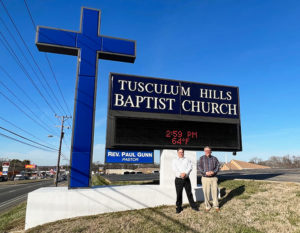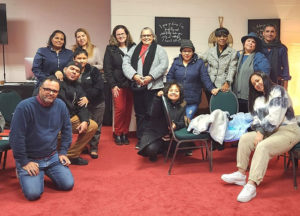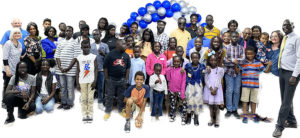
Pastor Paul Gunn, right, and Terry Hudgins, world outreach pastor, stand outside the facilities of Tusculum Hills Baptist Church in Nashville. The church is not only home to its own congregation, but also shares its space with six ethnic congregations on Sundays.
NASHVILLE — Nolensville Road in south Nashville is a busy four-lane highway. Along with fast-food restaurants, medical clinics, fitness centers, and pawn shops, the highway is also lined with aging strip malls that include Hispanic, South Asian, and Middle Eastern restaurants, a large stand-alone “world” market, and several stand-alone ethnic worship centers.
Dubbed the “international corridor of Nashville” in a 2014 article on immigration, this section of Nolensville Road is surrounded by neighborhoods with single-family homes — two- and three-bedroom ranchers dating back to the 1950s — and newer multi-family condominiums and apartments.
The nationalities within these neighborhoods are as diverse as the merchandise found on the shelves of the world market.
This community is also home to Tusculum Hills Baptist Church. Located on a hill overlooking Nolensville Road, Tusculum Hills is a predominantly Anglo congregation, also dating back to 1959.
When Pastor Paul Gunn arrived to lead the church in 2013, membership was dwindling as the demographic of the community grew more international.
With the support and encouragement of the church, one of Gunn’s goals quickly became to meet the new neighbors.
To reach the community, reach the children
Gunn and minister of music Terry Taylor believed that the best way to meet the people in the community was to offer programs for their children, explained Terry Hudgins, the church’s world outreach pastor.
In 2014 the church offered a summer music camp for kids. At the end of the week, the kids formed a choir and performed for their parents.
The church posted a video of the choir on social media, and members from First Baptist Church, Nashville, and Forest Hills Baptist Church, Nashville, expressed interest in supporting the outreach efforts. The result was a three-year partnership among these three churches to reach the people living in apartment complexes near Tusculum Hills, Hudgins said.
When Gunn arrived at Tusculum Hills, a small Chinese congregation was using the church’s building for their services. Chad Mize, the missions pastor at Forest Hills also connected Gunn with the late Raouf Ghattas, an Egyptian Baptist pastor who started an Arabic language Sunday School class at Tusculum Hills.
Then, a Haitian congregation contacted the church, requesting a place to meet. All three of those churches grew to the point that they are now in their own locations, Gunn said.

Renovacion Church is one of the congregations that uses the facilities of Tusculum Hills Baptist Church. The congregation is led by pastor Juan Natal, kneeling to the left. Natal also is a part-time new church catalyst with the Tennessee Baptist Mission Board.
From these beginnings, Tusculum Hills recognized their unique opportunity to use their facilities to reach the international community. Their willingness to follow through with action led the church to where it is today.
Six ethnic congregations share the church’s space on Sundays: three Burmese, representing three distinct people groups; one Chinese; one Spanish and one Sudanese.
The Korean School of Nashville uses the church’s facilities on Saturday, and a multi-cultural Bible study meets on Wednesdays. Many multinational groups, in addition to those mentioned, use the facilities regularly. “The building is used seven days a week,” he noted.
“Our philosophy isn’t to bring the church in and require them to be part of Tusculum Hills,” Hudgins explained. “We aren’t trying to make them ‘American’ churches. Instead, we allow them autonomy. … These are independent congregations. Some are tenants; some are partners. Several come and grow and leave.”
One of the benefits of this approach is the opportunity for children in the community to participate in the church’s international children’s Sunday School that meets each Sunday morning.
Many of the adults in the community are immigrants whose English may be limited, but their children are often fluent in English, Hudgins said.
The church schedules ethnic worship services before and after children’s Sunday School to allow the children opportunity for a multi-cultural Bible study in English. The children then worship with their parents in the family’s language either before or after children’s Sunday School.
‘Fish with a net, rather than a rod’
Pastor Juan Natal leads Renovacion Church at Tusculum Hills. Originally from Puerto Rico, Natal is bilingual in English and Spanish.
Although his congregation is primarily Spanish-speaking, Natal’s vision is to build a multi-cultural congregation that goes beyond Hispanics to include Africans, Arabs, Egyptians and other ethnicities who live in the neighborhoods surrounding Tusculum Hills and in the greater Nashville area.
“The church needs to look like the neighborhood,” Natal said. “We are not called to be a homogenous church; we are here to build a multi-cultural church for the glory of God.” To do that, Natal said, “We need to fish with a net rather than a rod.”
Pastor Ronald Ling is a bivocational pastor who leads Victory Myanmar Church at Tusculum Hills. As a Christian pastor and member of a minority ethnic group, Ling faced ethnic and religious persecution in his home country.
In 2007, he and his wife fled Myanmar. After seven years in Malaysia, Ling, his wife and young daughter arrived as refugees in Houston, Texas.
In 2015, the family relocated to Nashville.

Pastor Gasim Domkog, right, and South Haven Baptist Arabic Church, meet on Sundays at Tusculum Hills Baptist Church on Nolensville Road in Nashville.
Pastor Gasim Domkog started South Haven Baptist Arabic Church at Tusculum Hills in 2021.
Domkog, who grew up Muslim in South Sudan, fled north when civil war broke out in the country in 1983. Domkog entered the U.S. as a refugee in 2002 and settled in Atlanta.
In 2005, the young man became a Christian and later attended a Bible institute in Middle Tennessee. With the call of God on his heart, Domkog returned to South Sudan in 2012 to start a church. When civil war again broke out in his home country in 2021, Domkog returned to the U.S. and settled in Nashville.
Ling and Domkog represent more than 11,000 refugees from more than 40 countries who resettled in the Nashville area since 2002, according to the U.S. Office of Refugee Resettlement. Three non-profit organizations assist refugees with resettlement in the area.
Ethnic churches, in partnership with existing Anglo congregations, are in a unique position to support refugees as they adjust to life in a new country, Domkog said.
“Ethnic churches are vital to Middle Tennessee and Tennessee at large,” Domkog said. “There are growing populations of Muslims, Hindus, and others from Africa and the Middle East. We need to be able to reach people with the gospel.”
‘A city on a hill’
Reaching refugees with the gospel begins with meeting basic human needs, Ling said. When Ling moved to Nashville, he met many Burmese people who needed help.
“The Burmese people I met couldn’t drive. They couldn’t speak English. They needed help at government offices,” Ling said.
As Ling assisted other Burmese refugees with resettlement, a couple of families responded to his invitation to meet for worship. In 2019, the small group began meeting in their homes. By 2022, the group had grown to five families and dubbed their young congregation Victory Myanmar Church.
 They had also outgrown their space, so they began praying for a larger building. Because Pastor Ling and his church are Baptist, the church’s priority was to locate a Baptist church to host their services.
They had also outgrown their space, so they began praying for a larger building. Because Pastor Ling and his church are Baptist, the church’s priority was to locate a Baptist church to host their services.
Hudgins and Tusculum Hills offered a solution.
“Tusculum Hills is a central place to meet,” Ling said. Because the church cannot yet afford a full-time pastor, the ready-made space at Tusculum Hills suits the congregation well, and the international children’s service is a bonus, Ling said.
Both Domkog and Natal agree that the central location is a benefit. Other benefits include pastor trainings and leadership conferences the church holds and extends to ethnic pastors, Domkog said.
The church’s legacy and location in the community are also helpful, Natal said.
“I love that you can see the city of Nashville (from the church),” Natal said. “Tusculum Hills is a city on a hill. God is up to great revival in the city.”
Advice for Others
Hudgins offers the following advice for Anglo churches who want to open their facilities to ethnic congregations:
(1) Develop a written agreement signed by both parties that spells out the expectations. The agreement should include basic guidelines for the protection of children; understandings on how and when the space will be used; and how to prepare the space for the next group, Hudgins said.
(2) Ensure the ethnic congregation lines up doctrinally with your church, Hudgins said. The church requires ethnic congregations to agree to the Baptist Faith and Message. Hudgins acknowledged that the church has declined space to a few congregations that didn’t align with Southern Baptist doctrine.
(3) Allow each congregation autonomy and independence. “Don’t try to make them a Chinese version of your church,” Hudgins said.
(4) Provide space designated for each congregation. Understanding that groups may have to share space with the host church or with other ethnic congregations, allow each group the flexibility to personalize the space as much as possible.
(5) Ensure the host congregation supports the effort. “We’ve been fortunate,” Hudgins said. “Our church has been encouraging and welcoming to internationals.”
“The key is finding the first group,” Hudgins said. “Once that group is established, word will get around that your church is welcoming. The initial group will spread the word.” B&R — Gifts to the Golden Offering for Tennessee Missions help support the work of ethnic evangelism and church planting, including refugee resettlement and migrant ministry. The 2022-23 goal for this offering is $2.4 million. To give, visit tnbaptist.org/gotm.
